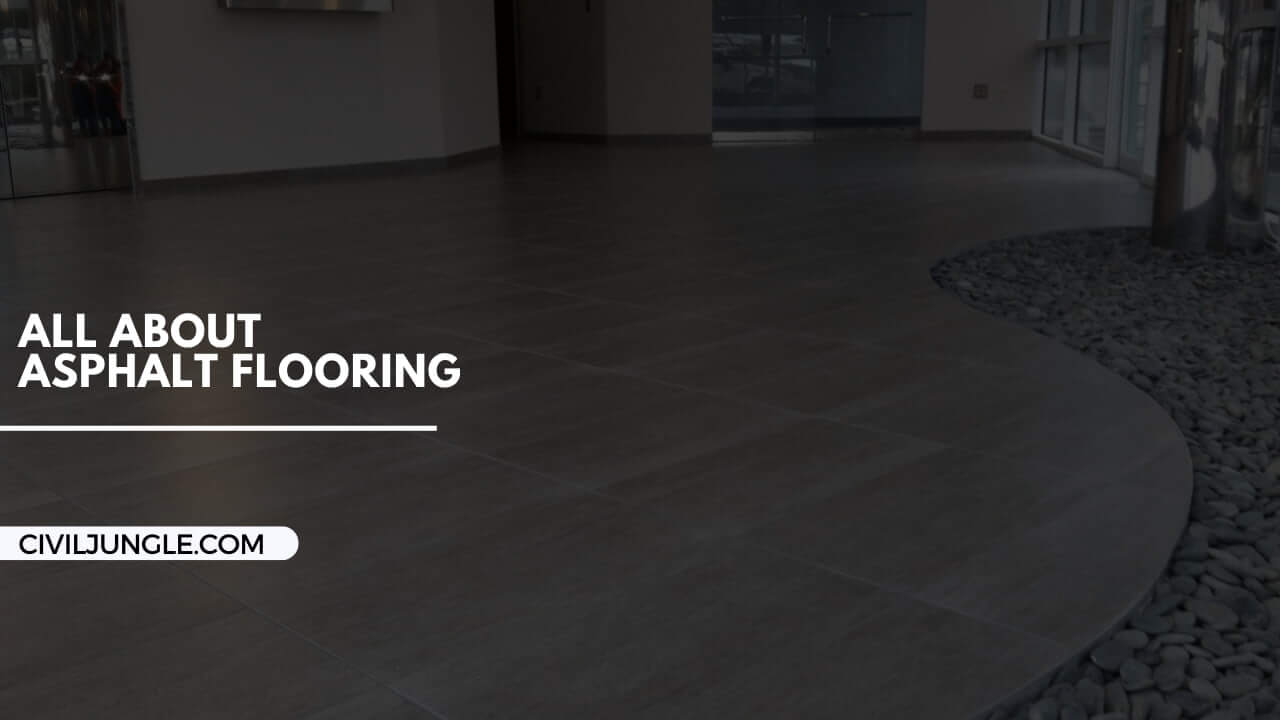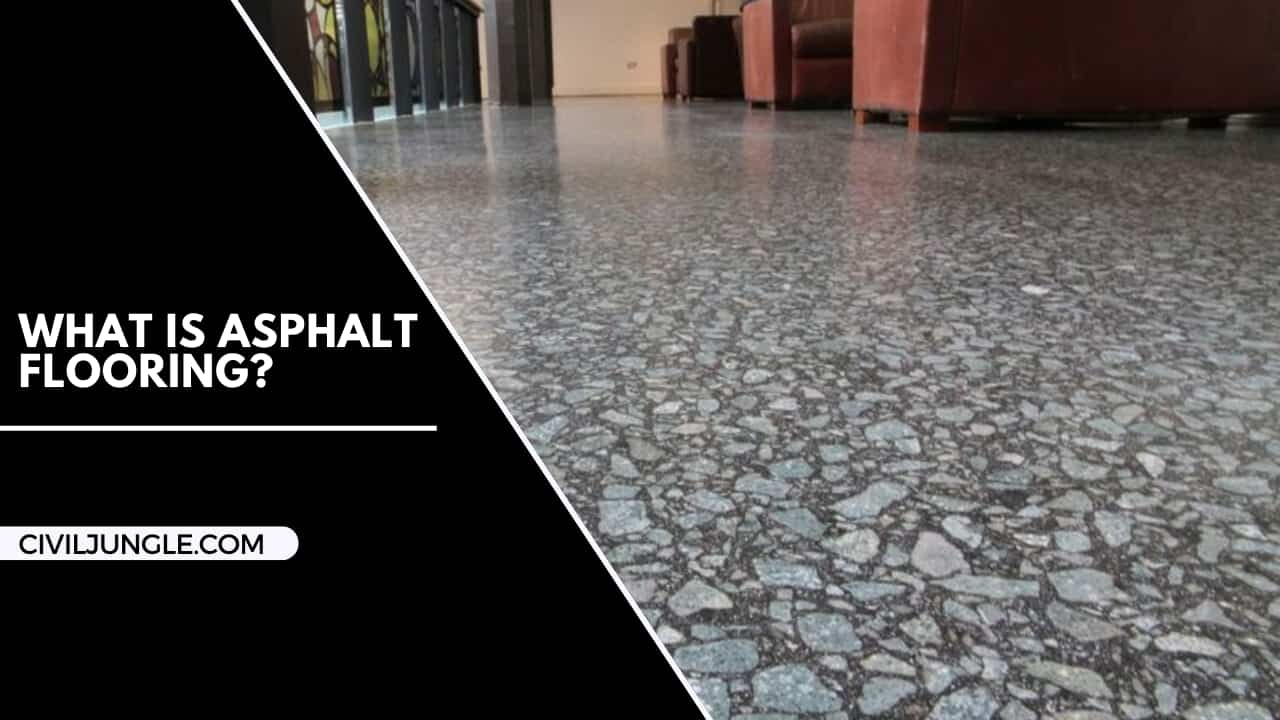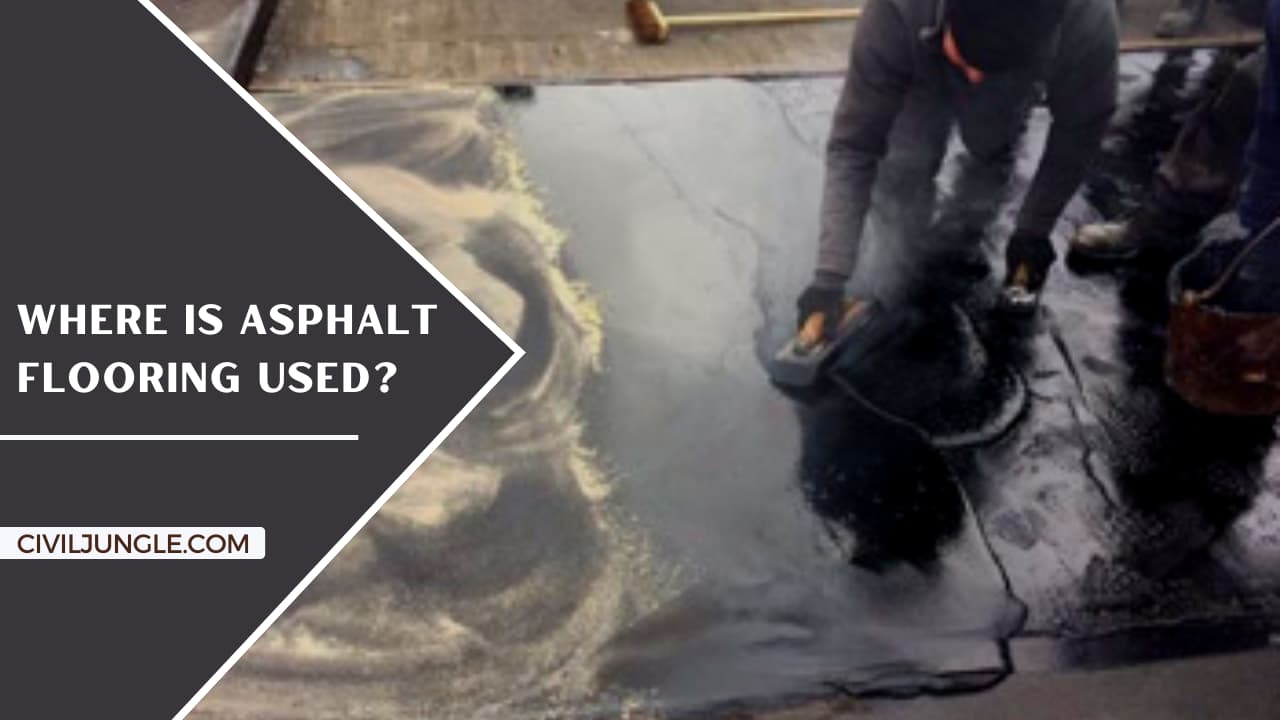
What is Asphalt Flooring?

This floor is water-resistance, unclean, junction, acid-resistance and charming in look and like pretty famous nowadays and this floor are even anti-skid and soundless. Asphalt flooring is a flat plane coating produced from a combination of asphalt, chrysotile, paint, and glass beads. It is generally about 1/8 or 3/16 inch flat and is impenetrable, flameproof, low-price, and straightforward.
Asphalt flooring will grow for humid and basic guidelines, whereas linoleum does not take so long, and it is virus-resistance, acidic and oils, and animal oil. It can apply where the floor climate is lower than 80 degrees Fahrenheit.
Where Is Asphalt Flooring Used?

Asphalt flooring uses implicit surface, trickle, veranda, flyover, footbridge, terrace, parking lots, etc. it can apply shortest to a current concrete foundation. Hence, it is helpful to release footbridges, patios, etc. most countries prefer asphalt flooring for its durability and solidity. Asphalt flooring has many benefits, like the garage, flyover, footpath, runways, etc.
Asphalt Flooring Price
Asphalt cost is $40 to $80 per ton, and asphalt flooring for a 2-car driveway costs $600 to $1200 based on the standard, capacity, and shipping fees. Asphalt flooring is more profitable than concrete but needs more care for house lords. Asphalt lasts 20-30 years, while concrete lasts 30-40 years.
Asphalt Flooring in the House
Usually, the flooring will not apply in homes, but this is currently modified as the designer admits that it is absolute as a foundation loop for floor covering PVC and different types of flooring. Its quick temperature reduction decreases the time it takes to offer a solid, long-lasting flooring ground which has grown its demand for asphalt house flooring.
Asphalt Flooring Advantages and Disadvantages
Here, the follows for advantages and disadvantages of asphalt flooring are as.
Advantages of Asphalt Flooring
Here, the pros of asphalt flooring are as follows.
- Asphalt flooring will create applying bitumen to offer an extra damp-proof base on surfaces.
- Asphalt streets will provide analysis for their power and long-lasting, so by applying asphalt flooring catalog in a vehicle parking lot, the durable and lasting plane will offer.
- Asphalt flooring assize block the mess forming a union with concrete flooring because of its design flooring. There is no requirement to clean every day.
- Applying asphalt flooring assize removes some fearful rough resolve and harm facts break the floor.
- An asphalt pathway balcony appears excellent in the durable is helpful in house flooring.
- She was offering an uneven end which makes the duck incline polished. Asphalt will regenerate material; you can apply it repeatedly because its lifespan is limitless.
- Asphalt is logical and straightforward regarding recovery; if you offer asphalt, less care will need.
Disadvantages of Asphalt Flooring
Here, the cons of asphalt flooring are as follows.
- Asphalt flooring is more careful than concrete; you must seal it off every 4-5 years to prevent it from breaking after using plaster. You don’t have to ride on the plane sometimes.
- If you’ve not varied and placed asphalt correctly, it will consume, and before flooring, you can maintain broken and former planes.
- If you want a great solution, you should heat it to 250 to 350 degrees F. before the asphalt flooring on the plane, and you should coat it with sand or different items to get more compression and a long-lasting lifeline.
- Later asphalt will make from fuel, which generates damage when the organic compound will remove—reversal asphalt, which will apply to create asphalt concrete free of more organic compounds.
- Asphalt flooring needs a tracked vehicle to construct, and without flooring hardware, you will not be capable of installing the asphalt.
Preparation and Installation of Asphalt Flooring
Following are the steps for preparing and installing asphalt flooring.
- Cleaning- before installation, the former floor needs to be cleaned and separate the cement, sand, or more. You will require massive apparatus to support you separate the previous asphalt. Clear all demolish and make it spotless before installation. Also, divide small trees and grasses. Having more tanks between structures is unnecessary as this can create upcoming issues.
- After cleaning, set the lean to secure proper wastewater. Accurate pouring will support stopping your flooring from falling in early. The floor passes the water drain to the edge and pool.
- Installing a sub-base will give flooring a strong base and central support system- so it is indispensable. In the cold, the sub-base works as an ice bridge, decreasing cracks from often complex defrosting.
- When the sub-base sets and is compressed, it’s time to proof roll. Proof rolling ensures the basic pattern is stable to help the asphalt and burden.
- Add your folder layer. After you have the sub-base and the base’s smooth zone recovered, it’s time to set your folder base. The binder layer will mix materials and oil to support your asphalt and make it stable and more lasting.
- Finally, install the new asphalt flooring. The mixture of sand, oil, and small particles makes that pitch black appearance, and while appropriately constructed, it offers soft, bright, and charming flooring.
- The last step is your new asphalt joints for pavement, highway, and parking space because you will need to move smoothly between the two formations.
Mass for Flooring
Depending on the calculation you offer for necessary length (l), width (w), and thickness (t), the measurement solves the area and volume of asphalt flooring by applying the below formula.
- Area= length x width
- Volume= area x depth
For density, you can apply weight= volume x density.
Asphalt Flooring
Asphalt tile, smooth-surfaced floor covering made from a mixture of asphalts or synthetic resins, asbestos fibres, pigments, and mineral fillers. It is usually about 1/8 or 3/16 inch (about 3 mm or 4.8 mm) thick and is nonporous, nonflammable, fairly low in cost, and easily maintained.
What Is Asphalt Tile Flooring?
Asphalt Tile (asphalt-asbestos tile): Is a type of tile that contains asbestos used predominately between the 1920s-1960s. Often tiles were of 9″x9″ size (pre-1960) and 12″x12″ (post-1960) and typically produced in dark colors (black & dark gray) as asphalt was the main binder.
Asphalt Flooring Price
Asphalt paving runs $7 to $13 per square foot, including materials and installation. If you’re paving a typical driveway measuring about 600 square feet, you can expect to pay $4,200 to $7,800.
Asphalt Paving Cost Per Sq Ft
In terms of cost, asphalt paving typically runs about $3.00 to $4.00 per square foot, depending on the scope of the project (quality & topography of your property, slopes, curves, etc.). Concrete is another choice, but it typically runs about $6-7.00/SF.
Asphalt Cost Per Square Foot
According to Thumbtack, the national average for asphalt paving is $3 to $5 per square foot, compared with the $8 to $18 per square foot for concrete paving. These averages are helpful when trying to get a ballpark estimate.
Asphalt Resurfacing Cost Per Sq Ft
Resurfacing an asphalt driveway costs $3 to $7 per square foot. Compare that to the cost of replacing an asphalt driveway, at $8 to $15 per square foot. To keep costs down and extend the life of your driveway, if it’s less than 15 years old and has less than 30% surface damage, then resurfacing is a solid choice.
Asphalt Square Foot Cost
Asphalt paving costs $7 to $13 per square foot, including minimal grading services. Materials cost from $2 to $6 per square foot, and installation costs $5 to $7 per square foot. Excavation of added curbs or a sidewalk is extra cost.
Is Asphalt Flooring Any Good?
Asphalt Flooring One of the Longest Lasting Flooring Materials. Mastic asphalt flooring can outperform and outlive almost nearly every other type of flooring material. Its durability and damp-proof properties make it the flooring material of choice for many specifiers.
What Is Asphalt Tile Made Of?
A resilient, low-cost floor tile composed of asbestos fibers, finely ground limestone fillers, mineral pigments, and asphaltic or resinous binders. Requires waxing and buffing; set in mastic over wood or concrete subfloor; is not greaseproof unless specially treated.
Can You Tile Over Asphalt Floor?
Flooring grade asphalt is the only material suitable for tiling onto. Do not lay onto roofing grade asphalt. It should be a minimum of 15mm thick throughout the entire area. The surface should be crack free.
Like this post? Share it with your friends!
Suggested Read –
- Soft Linoleum Flooring
- 100 Ways to Save Energy at Home: Energy Saving Tips
- What Is Calacatta Quartz | 12 Types of Calacatta Quartz
- Sandbag Cofferdam | What Is Sandbag Cofferdam | Advantages of Sandbag Cofferdam
- All About Pony Wall | What Is a Pony Wall | Uses of Pony Wall | Pros and Cons of Pony Wall
- What Is Sewage Pump | Types of Sewage Pump | Advantages and Disadvantages of Sewage Pump

